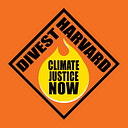Seeding Sovereignty: Divestment’s Intersectionality with Indigenous Womxn’s Rights
As the message of divestment is amplified, we must remember the intersectionality of the fight to curb the climate crisis. Fossil Fuel Divest Harvard and the Yale Endowment Justice Coalition stand in solidarity with the Indigenous womxn-led collective Seeding Sovereignty and is grateful for their executive director’s support of our #NobodyWins action. We recognize the disproportionate impact of fossil fuel extraction and petrochemical production on communities of color, and especially on indigenous women and children.
Their work educates us on the direct intersectionality of the divestment movement and the unaddressed crisis of Missing and Murdered Indigenous Women. According to the Seeding Sovereignty website: “There is a direct correlation between increased rates of sexual abuse, trafficking and domestic violence against women and children in regions where fossil fuel extraction companies set up ‘man camps’ to house workers.”
As we advocate for our universities to divest from fossil fuels, we are inspired by localized environmental justice initiatives such as Seeding Sovereignty’s Pipeline to Plastics program, which addresses the fallout of increasing plastics production fueled by fracked gas extraction on overburdened communities Appalachia, Louisiana, and the Permian Basin region of Texas and New Mexico. Rates of poverty in the “cancer alley” exceed 50% in some counties; rates of sexual assault and violent crime balloon along with oil extraction in “boom” cities. Petrochemical production causes serious ecological damage globally, but most immediately impacts the health of people living near production sites, who overwhelmingly consist of the demographic groups least able to fight back against corporations.
“We are all complicit in the funding of fossil fuels and […] continued violence against Native peoples.”
Indigenous women — already targets of trafficking and of state and police violence — face unique legal obstacles to pursuing justice in cases of assault by petroleum workers, leading to astronomically low rates of report and investigation. Oil and coal extraction are often subsidized by taxpayer money and buoyed by the support of large banks and the endowments of universities like Harvard and Yale. When our institutions invest in fossil fuel companies, Barbara Clabots writes, “we are all complicit in the funding of fossil fuels and […] continued violence against Native peoples.”
We are honored to have you as an ally, Seeding Sovereignty. To learn more about their inspiring work, visit their website.
Statement by Executive Director Janet MacGillivray on the Harvard-Yale disruption:
“The Indigenous womxn of Seeding Sovereignty stand with this youth led action to demand institutions divest from the dangerous and reckless fossil fuel corporate infrastructure to protect Mother Earth and all her beings at a time of climate crisis. Frontline communities know that violence to our planet is connected to violence to our womxn and girls. We cannot be silent and on the sidelines when our planet has a fever and global neighbors are rising up to demand justice while our current administration refuses any tangible commitments to halt climate warming. In solidarity with the students, we call on you to divest, and invest in regenerative solutions and a just transition for a livable planet for all communities and for future generations.”
